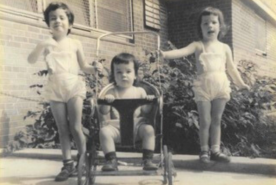Tests and procedures Prevention, daily life, and wellbeing Organ and tissue transplantation and donation Blood tests Mental health and wellness Living donation Creatinine Depression and anxiety
August 18, 2018
After donating a kidney to her 7-year-old son, a young mother faces post-transplant depression
By Tate Gunnerson
There’s a reason that the term “mama bear,” which refers to a mother’s often ferocious protective instinct, is a cliché. Traci Kozak-Krist, a third-grade teacher in a rural New York town, is a good example. When Traci ‘s son, Tanner, was born with malformed kidneys, she was prepared, even determined, to give him one of her own if necessary. Fortunately, both she and her husband Matt were matches for their son, and when Tanner was 5-years-old, they decided Matt would be the donor.
“They wanted the most organized person to take care of the other two people, and that’s me,” Traci said. “As a teacher, you have a plan, you make a schedule and you stick to it.”
Initially, the procedure appeared to be a success. Tanner’s creatinine levels - a measure of kidney function - returned to normal levels, and Matt and Traci were hopeful that he would have a normal childhood. But 18-months later, a circulation problem caused the kidney to fail, and Tanner was put on dialysis twice a week. The couple was “devastated,” Traci said, but they had very little time to process the intense feelings before it was her turn to donate her kidney to Tanner.
“I was the backup plan, but that wasn’t supposed to happen for 20 - 30 years,” Traci said.
When Matt donated his kidney, he rebounded quickly and returned to work as a police officer several weeks later. For Traci, on the other hand, the recovery was more challenging. The first time she attempted to go for a run “it felt like my insides were slamming against a brick wall,” Traci said. “I think it was more painful to donate a kidney than to have my son by c-section.” For Traci the pain was hard to ignore; she felt a dull pain when she laughed, tied her shoes or even just tried to stand.
But sometimes Traci was so depressed that she didn’t even feel like standing or even getting out of bed in the morning. She also struggled with anxiety. While Tanner was doing well, Traci obsessed about his health and worried about the future. The possibility that she might develop kidney disease someday also worried her.
“With one kidney, you’re at higher risk,” Traci said. “Maybe my subconscious was focused on that.”
Depression, anxiety and other emotional issues are commonly experienced by living donors. When the psychological team at the transplant center checked in with Traci, she was honest about her feelings, and she took their advice. She began journaling and gave herself assignments - a trip to the grocery store, for example, or just a walk around the block. By the time she began to prepare for the upcoming school year, Traci’s depression had lifted.
“I was just a typical person, Traci said, “not a person caring for a kid with kidney disease or thinking about my own health.”
With a renewed spirit and Tanner doing well, Traci decided to give back. She began volunteering for the National Kidney Foundation and the Upstate New York Transplant Services (Unyts). She even did a TV commercial. It’s important, she said, to educate people.
“If you don’t want to be a living organ donor, you can donate blood or register as an organ donor after death,” Traci said. “It has the potential to help so many people.”
At 17-years-old, Tanner is thriving, but rejection is a very real possibility. He was treated for rejection twice last year, and three times the year before, each requiring multiple days in the hospital. Traci has lost count of how many times in total. But she is grateful for every single day.
“We couldn’t do it without our family and support,” Traci said. “With everything we’ve been through, we’re still blessed.”


















